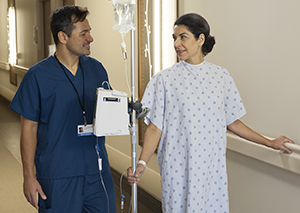Recovering from Colorectal Surgery
Recovering from Colorectal Surgery

Right after surgery
If you have a urinary catheter, it will probably be removed shortly after surgery. Your intravenous (IV) line will remain in place for a few days to give you fluids. And you’ll continue to receive medicine for pain. Soon after surgery, you’ll be up and walking around. This helps improve blood flow and prevent blood clots. It also helps your bowels return to normal. You’ll be given breathing exercises to keep your lungs clear.
Eating again
You won’t eat or drink much until your colon begins working again. You'll begin with a liquid diet, then move on to solid foods.
Recovering at home
In most cases, you’ll visit your healthcare provider within a few weeks after leaving the hospital. You can get back to your normal routine about a month or 2 after surgery. Full recovery may take 6 weeks or longer. While your body heals, you may tire more easily. You also are likely to have some bloating. Loose stools and more frequent bowel movements are common after bowel surgery. This may get better over time, but may never disappear completely.
Resuming everyday activities
Being active helps your body heal. But you must protect your healing incisions:
Walk as much as you feel up to.
Avoid heavy lifting or vigorous exercise until your healthcare provider says it’s OK. Follow your healthcare provider’s advice about climbing stairs and bathing.
You can drive when you’re no longer taking pain medicines—in about 7 to 10 days.
Follow your healthcare provider's advice about resuming sexual activity.
Call your healthcare provider
Call your healthcare provider if you have:
Fever of 100.4°F (38°C) or higher, or as directed by your healthcare provider
Persistent nausea or vomiting
Unusual redness, swelling, drainage, or pain around your incision
Severe constipation or diarrhea
Worsening pain
Leg swelling or trouble breathing
Bleeding from the rectum
Difficulty or inability to urinate
Updated:
July 03, 2017
Sources:
Patient Information: Colectomy (The Basics). UpToDate
Reviewed By:
Lehrer, Jenifer, MD,Sather, Rita, RN